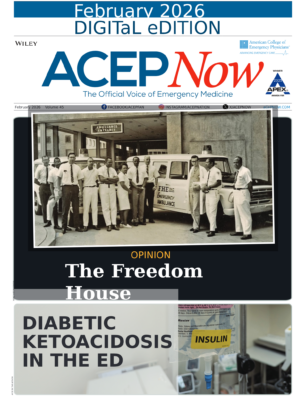A relatively new Georgia law provides amnesty for people who show up to emergency departments to receive treatment for a drug overdose, and it’s getting some backing from the Georgia College of Emergency Physicians.
The chapter’s President, John Rogers, MD, CPE, FACS, FACEP, said that while the chapter has not held formal discussions on the law, approved in April, “we have been in support of physicians who decide to do so.”
Known as the “Georgia 9-1-1 Medical Amnesty Law,” the legislation allows physicians and other health care professionals who prescribe naloxone and the people who administer it in the case of an overdose to be immune from any civil or criminal charges if the action is done in good faith. It also provides limited immunity for patients from arrest, charge, and prosecution for drug charges and certain underage drinking offenses.
“My personal opinion is that it will save lives, particularly by empowering EMS, other first responders, and bystanders to administer naloxone,” Dr. Rogers wrote. “This places protecting lives above law-enforcement concerns. This as it should be.”
Dr. Rogers, co–medical director of the emergency department at Coliseum Health System in Macon, Georgia, said he hasn’t personally written any prescriptions for naloxone, but he appreciates the protections built into the law.
On a cautionary note, he wants emergency physicians to know that while the new rule provides “professional immunity” for the prescription and administration of the nonaddictive medication, it is not a free pass for the entire course of a patient’s treatment.
This places protecting lives above law-enforcement concerns. This as it should be.—John Rogers, MD, CPE, FACS, FACEP
“To me, the protections are clear: as long as one is acting in good faith and within standard of care, there is complete immunity from civil and criminal action or sanction by the Georgia Board of Medical Examiners,” he wrote. “However, this is limited to the prescribing of the naloxone, not an all encompassing protection for the entire encounter.”
Georgia became the 15th state to enact a 911 Medical Amnesty law, according to the North Carolina Harm Reduction Coalition, which tracks the field. It became the 19th state to expand access to naloxone through legislation.
The law is intended to encourage opiate users to call a hospital during an overdose. In Washington State, a similar law was passed in 2010. The next year, a study found that 88 percent of opiate users indicated that once made aware of the law, they were more likely to call medical authorities during an overdose.
Richard Quinn is a freelance writer in New Jersey.
Pages: 1 2 | Multi-Page





One Response to “Georgia Joins Ranks of States Supporting Naloxone Use in Overdose Cases”
January 22, 2015
New Approach to 911 CPR Instructions Can Save Lives - ACEP Now[…] A three-year study of a statewide Arizona resuscitation program to give CPR instructions to people w… according to one researcher. […]